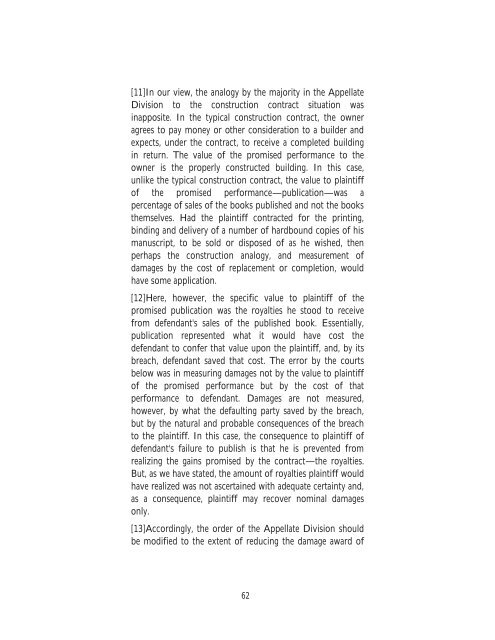Contract Doctrine, Theory & Practice Volume 3, 2012a
Contract Doctrine, Theory & Practice Volume 3, 2012a
Contract Doctrine, Theory & Practice Volume 3, 2012a
You also want an ePaper? Increase the reach of your titles
YUMPU automatically turns print PDFs into web optimized ePapers that Google loves.
[11] In our view, the analogy by the majority in the Appellate<br />
Division to the construction contract situation was<br />
inapposite. In the typical construction contract, the owner<br />
agrees to pay money or other consideration to a builder and<br />
expects, under the contract, to receive a completed building<br />
in return. The value of the promised performance to the<br />
owner is the properly constructed building. In this case,<br />
unlike the typical construction contract, the value to plaintiff<br />
of the promised performance—publication—was a<br />
percentage of sales of the books published and not the books<br />
themselves. Had the plaintiff contracted for the printing,<br />
binding and delivery of a number of hardbound copies of his<br />
manuscript, to be sold or disposed of as he wished, then<br />
perhaps the construction analogy, and measurement of<br />
damages by the cost of replacement or completion, would<br />
have some application.<br />
[12] Here, however, the specific value to plaintiff of the<br />
promised publication was the royalties he stood to receive<br />
from defendant's sales of the published book. Essentially,<br />
publication represented what it would have cost the<br />
defendant to confer that value upon the plaintiff, and, by its<br />
breach, defendant saved that cost. The error by the courts<br />
below was in measuring damages not by the value to plaintiff<br />
of the promised performance but by the cost of that<br />
performance to defendant. Damages are not measured,<br />
however, by what the defaulting party saved by the breach,<br />
but by the natural and probable consequences of the breach<br />
to the plaintiff. In this case, the consequence to plaintiff of<br />
defendant's failure to publish is that he is prevented from<br />
realizing the gains promised by the contract—the royalties.<br />
But, as we have stated, the amount of royalties plaintiff would<br />
have realized was not ascertained with adequate certainty and,<br />
as a consequence, plaintiff may recover nominal damages<br />
only.<br />
[13] Accordingly, the order of the Appellate Division should<br />
be modified to the extent of reducing the damage award of<br />
62


















